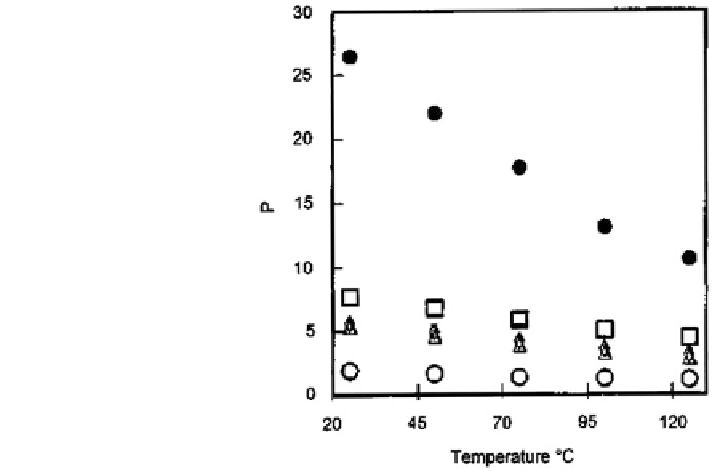Geoscience Reference
In-Depth Information
Fig. 16.22 Plot of partition
coefficient (P) versus
temperature for alkylphenol
(open circle), m-(open
triangle). p-(open diamond),
o-(open square) cresols, and
3,5-DMP (filled circle) after
1:1 equilibration of Miller oil
and (deionised) water at 25
bars. Reprinted from Bennett
and Larter (
1997
). Copyright
1997 with permission of
Elsevier
consequence, differences between phenol and p-cresol decrease with increases in
temperature. Similar results for oil-deionized water and oil-brine experiments
show that increasing temperature leads to a decrease in partition coefficient values.
It is known that pressure may affect the solubility of a compound. Analysis of
alkylphenol partitioning in crude oil reservoir-water systems, as affected by
pressure, was performed by Bennett and Larter (
1997
). In these experiments, the
presence of gases was neglected; and a pressure of 340 bars, similar to that
encountered in North Sea crude oil reservoirs, was chosen as the highest value.
Alkylphenol partition coefficients measured at pressures of 25, 200, and 340 bars,
as a function of temperature, are shown in Fig.
16.23
. Over the pressure range
studied, only slight variations in the partition coefficients were observed at a
temperature of 25 C; the phenol partition coefficient decreased from 1.95 at a
pressure of 25 bars to 1.77 at 340 bars. Similar low differences in the effect of
pressure on partitioning values were measured at a temperature of 125 C. Bennett
and Larter (
1997
) conclude that a pressure lower than 340 bars and a temperature
lower than 125 C do not significantly affect the partitioning of alkylphenols in a
crude oil-water system. On the other hand, o-cresol shows sensitivity to temper-
atures over the range 20-125 C but is insensitive to pressure.
The effect of brine salinity on the dissolution of alkylphenols, from crude oils
into water with variable electrolyte concentration (0-100 mg/L NaCl), leading to
depletion of the original pollutant, is presented in Fig.
16.24
. By increasing the salt
concentration in the ''washing'' water, the partition coefficient of alkylphenols
increases, indicating preference for the petroleum phase at higher water salinity.

